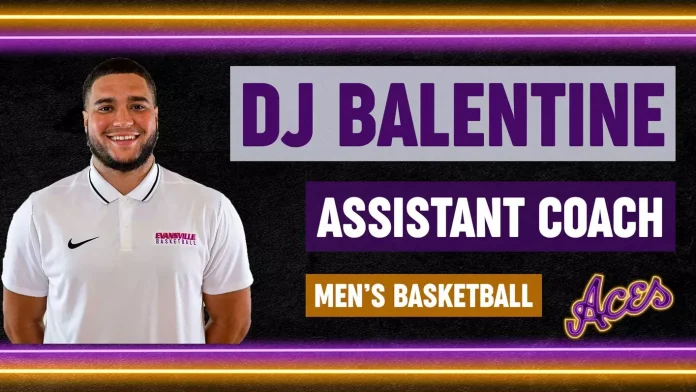|
||||||||||||||||||||||||||||||||||||||||||||||||||||||||||||||||||||||||||||||||||||||||||||||||||||||||||||||
HOT JOBS
HOT JOBS
|
||||||||||||||||||||||||||||||||||||||||||||||||||||||||||||||||||||||||||||||||||||||||||||||||||
D.J. Balentine promoted to Assistant Men’s Basketball Coach
D.J. Balentine promoted to Assistant Men’s Basketball Coach
UE’s all-time leading scorer returned to the program in 2023
EVANSVILLE, Ind. – Following his first season on the University of Evansville men’s basketball coaching staff, D.J. Balentine has been promoted to Assistant Coach for the Purple Aces.
“Anyone who has spent time around DJ, the person, quickly learns how positively contagious his energy is. Anyone who has spent time with DJ, the basketball coach, quickly learns how great of a basketball mind DJ has,” Aces head coach David Ragland exclaimed. “DJ did a wonderful job in year one of preparing and presenting our player personnel portion of each scout. He does a really good job helping our student athletes display confidence in their game by clearly communicating directions so that they can effectively execute what is being asked of them.”
“We were excited to bring DJ back home last season and now ecstatic to elevate him as an assistant coach as he has earned this opportunity through his hard work and commitment to our program.”
Balentine joined Coach Ragland’s staff in 2023 as the Director of Player Development. His work helped UE advance to the postseason for the first time since 2015 when the Aces won the CIT Championship. Balentine was a junior on that squad.
“I couldn’t be more thankful to continue to build success at a place that means so much to me. This University is special, and with that being said, I want to thank everyone in athletics and administration for this opportunity to elevate my position,” Balentine said. “I am extremely grateful for Coach Rags and the rest of the staff; he has given me much responsibility and instilled confidence in me to further my coaching and to better this program. With Coach Ragland and the entire staffs’ ability, even greater things are on the horizon. GO ACES!”
Biden cancels $1.2B in student loan debt, including for healthcare workers
Biden cancels $1.2B in student loan debt, including for healthcare workers
The Biden administration is canceling an additional $1.2 billion in student debt for more than 35,000 public service workers, which includes nurses and other healthcare workers.
The assistance applies to those in the Public Service Loan Forgiveness Program, which includes workers in law enforcement, public health and education as well as physicians, nurses and other healthcare workers. Eligibility is reserved for governmental employers and nonprofit organizations. Public health is a qualifying public service and applies to physicians, nurse practitioners and nurses in clinical settings.
According to Bloomberg, individuals in the latest round of loan forgiveness “received waivers or were affected by regulatory changes that gave them more credit toward the system’s decade-long payment requirement.” Recipients in previous rounds had made 120 qualifying monthly payments, about 10 years’ worth, and had the remainder of their debt balances canceled.
Under the Biden administration, the Education Department has forgiven $165.5 billion in student debt for nearly 5 million Americans. Borrowers have received an average of $35,000 in debt cancellation.
Smoke Testing Scheduled on Evansville’s East Side
Smoke Testing Scheduled on Evansville’s East Side
Over 2,000 properties are within the smoke-testing area
July 20, 2024
(Evansville, Ind.) – From July through early September, Evansville Water and Sewer Utility (EWSU) is partnering with Wessler Engineering to conduct smoke testing and sewer line inspections in several neighborhoods on Evansville’s East Side. The smoke testing is expected to continue for approximately 6-to-8 weeks, weather permitting.
More than 2,200 properties are within the smoke testing area roughly bounded the Lloyd Expressway to the north, Newburgh Road to the south, the Vanderburgh-Warrick County Line to the east and just west of Harrison High School. The evaluation is part of a study to reduce stormwater from entering the sanitary sewer system in compliance with a federal consent decree. Areas on Evansville’s East Side were identified as a project for the study because of a high amount of rainwater entering the sewer system in those areas. (see attached smoke testing area map)
Smoke testing uses fans to blow simulated “smoke” into the sanitary sewer system. The smoke is highly visible so technicians can see it seeping out of broken and cracked sewer lines, eroded utility holes, and other sanitary sewer structures if there are defects.
During testing, smoke may also be seen coming from gutters, which may indicate they are connected to the city’s sewer system. The City of Evansville Municipal Code (Section 13.05.070) prohibits any stormwater, groundwater, roof runoff or subsurface drainage from discharging into the sanitary sewer system. Gutters, downspouts and sump pumps tied to the sewer system must be removed by the property owner.
Smoke testing is non-toxic and will not harm humans, pets or plants, or stain drapes, carpeting or other materials. Smoke should not enter buildings during testing. If smoke gets inside a building, it could be from a defect in the internal plumbing, such as a bad toilet seal or broken pipe. EWSU is not responsible for plumbing within homes and recommends contacting a plumber to investigate.
A dry water trap may also allow smoke to enter homes and building. If fixtures such as sinks, toilets or bathtubs have not been used for a while, EWSU recommends running water before smoke testing begins to make sure the traps are not dry. Bright orange door hangers notifying residents and businesses in the area about the smoke testing will be distributed 48 hours in advance of testing.
As part of this project, Wessler will seek to survey homeowners and schedule sump pump inspections within a smaller area roughly bounded by Lincoln Avenue to the north, Newburgh Road to the south, Fuquay Road to the east, and Park Plaza Drive to the west. Approximately 450 property owners within this area will receive a brief survey and a letter asking them to complete the information and schedule the inspection. (see attached sump pump inspection map)
For more information about the project, contact Wessler Engineering Project Manager Josh Hood at 812-205-7568, or EWSU Capital Projects Manager Mitch Ferguson at 812-421-2120 ext. 2273.
Graduation of the 85th Indiana State Police Recruit Academy
Graduation of the 85th Indiana State Police
Recruit Academy
July 19, 2024
(Indianapolis, IN)-This evening, July 18, 2024, the 85th Indiana State Police Recruit Academy completed its graduation ceremony in the Indiana State Capitol Rotunda. Indiana State Police Superintendent Douglas G. Carter made opening remarks and commencement address
After the commencement address, the oath of office for the 21 new State Police Troopers was delivered by The Honorable Justice Christopher M. Goff, of the Indiana Supreme Court. Superintendent Carter and his staff presented Each new Trooper with their badge and official identification.
Today’s graduation marked the culmination of 24 weeks of intense training which totaled more than 1,100 hours. Some subject areas of training included criminal and traffic law, de-escalation, emergency vehicle operations, defensive tactics, firearms, impaired driving detection, scenario-based training, and a host of other academic subjects related to modern policing.
Each graduating Trooper will be assigned to one of 14 State Police Posts across Indiana. Once at their assigned district, the new troopers will spend the next three months working side by side with a series of experienced Field Training Officers. The purpose of the field training is to put to practical application the training received throughout the formal academy training. Upon successful completion of field training, the new troopers will be assigned a state police patrol vehicle and will begin solo patrol in their assigned district.
* Included below is a link to the graduation ceremony program which lists each new Trooper’s name and district of assignment.
85th Indiana State Police Recruit Academy Graduation Program

Each graduating Trooper will be assigned to one of 14 State Police Posts across Indiana. Once at their assigned district, the new troopers will spend the next three months working side by side with a series of experienced Field Training Officers. The purpose of the field training is to put to practical application the training received throughout the formal academy training. Upon successful completion of field training, the new troopers will be assigned a state police patrol vehicle and will begin solo patrol in their assigned district. * Included below is a link to the graduation ceremony program which lists each new Trooper’s name and district of assignment. |
What caused the Midwest to thrive? Education
What caused the Midwest to thrive? Education
By Michael Hicks, PHD
JILY 19. 2024
A recently released study by economists from Yale and UC San Diego unlocked a key insight into the way the Rustbelt developed. Like most studies, it is just one piece of the puzzle. I found it insightful because it is yet another challenge to the view that attracting capital drives regional economic growth. In other words, jobs follow people, people don’t follow jobs.
This study, titled “Sprouting Cities: How Rural America Industrialized,” used recently released individual Census data from 1880 to 1940 in the United States. This allowed the authors to track individual people as they changed occupations and locations. Like many readers, my grandparents, great-grandparents and great-great-grandparents are in these data, so it is of special interest to me.
They found that most of the industrialization in the country occurred as a result of factories springing up in rural counties, absorbing local agricultural workers. Over those six decades, only about 10 percent of industrialization could be explained by cross-state migration of workers.
In the single most mobile decade, 1910 to 1920, only one-fifth of industrial employment growth was due to inter-state migration of workers. That was the decade that brought us the hit song “How Ya Gonna Keep ’em Down on the Farm (After They’ve Seen Paree)?” This song was oddly prescient given agricultural employment in the United States dropped by half over the following 20 years.
This study was an enormous undertaking since it had to match people across decades, which involved about half a billion Census records. These were only recently computerized from handwritten entries. To give some sense of the challenge, my happily simple surname apparently changed from Hicks to Hix and back to Hicks over this time period. Goodness knows how they handled the Vongrosssteinhausen or Postlethwaite families.
I particularly appreciated this work, in part because it rejects a common view that factories came to the Midwest because of canals and rivers, gas or oil, railroads or other natural resources. This study supports my argument that the Midwest became the factory center of the world because it was teeming with educated, healthy workers. Here’s that story.
The Midwest was settled from 1790 to about 1840, first by land grants to Revolutionary War veterans, then to immigrants from northern Europe. This region was settled under the Northwest Ordinance, which set aside land that would generate revenues for local schools. The language on education in that ordinance lives on in state constitutions, including Indiana’s.
The Midwest built schools everywhere, for everyone. Many of these persisted until the 1940s, including one in Rome, Ind., which my father attended, and another in Economy, Ind., where my wife’s aunt taught in the early 1930s. The best evidence is that Indiana was universally literate before England. This is a monumental human achievement.
The land grants were modest. Privates and non-commissioned officers received 100 acres. Thus, within three generations, the population outstripped the ability of them to financially support these families. So, shortly after the Civil War, the Midwest found itself in an unusual position. We had more people than the land could easily support, but nearly everyone could read, write and do basic arithmetic.
In the humble Midwest, in places like Howard, Delaware, or Henry counties, the perfect combination of learning and skills matched the demands of the mid-industrial revolution. The schooling was surprisingly robust. Its worth noting that among Indiana’s great early authors—Lew Wallace, James Whitcomb Riley, Edward Eggleston and Gene Stratton-Porter—none progressed beyond 8th grade. These were savants, but literacy was widespread and more than sufficient for the jobs that lay in the distant future. Everyone could read, and did.
The math was rigorous as well. One 8th grade question in 1895 read “District No. 33 has a valuation of $35,000. What is the necessary levy to carry on a school seven months at $50 per month, and have $104 for incidentals?” That is Algebra, and about what is necessary for most jobs even today.
Here basic schooling was matched by practical experience on the farm. The physics of water pumps, the calibration of a hit-and-miss engine and the calculation of seed requirements all demanded practical skills. I don’t suggest all students could write like Wallace, or perform Algebra like today’s high school students. But by global standards of 1880 to 1940, small Midwestern towns were a gold mine of human capital.
As soon as the Industrial Revolution took hold in the United States, its movement to the Midwest was inevitable. Of course, other factors played a role in what would be manufactured in the Midwest and in which county it might be produced. Natural gas, oil and waterways all drove the final locations for many industries. But, if it wasn’t glass in Muncie, it would be something else. It was always the people who drew in the factories.
There was perhaps a period, from 1945 to the 1960s, where attracting a business would’ve meant population and employment growth. But then it only really mattered in the South and Southwest. There is very little evidence that the hundreds of billions of dollars in tax incentives, or tens of billions of site-specific infrastructure spending created a single enduring job in the Midwest.
The Yale-UCSD paper held one more big insight beyond the initial development of these local factory towns. The new cities formed from this concentration of agricultural workers into new manufacturing towns haven’t fared well since. As it turns out, most of these places failed to expand “consumer” services as their cities grew. When the factories closed, they could not sustain their population.
Most readers will recognize that “consumer services” represent some key elements of quality of life. These consumer services include retail trade, entertainment and other personal services. The cities that thrived had an abundance of these quality-of-life businesses to keep residents.
There’s more than that to a successful quality of life strategy, including good schools and a high-functioning local government. Those things are themselves necessary for good consumer services firms to consider locating in a city.
We are in the midst of a gubernatorial election that will direct our economic development policy for most of the next decade. Thus far, much of the debate has been about how best to attract new jobs to Indiana. The real discussion should be how we make more cities people want to live in. Over the past century and a half, all our great economic successes in the Midwest have come from doing so. Likewise, almost all our failures have come from not doing so.
Link to this commentary: https://commentaries.cberdata.org/1259/what-caused-the-midwest-to-thrive-education
Tags: economic development, education, incentives, Indiana, jobs and employment, manufacturing, migration and population change, midwest, public services, quality of life and placemaking, schools k-12, state and local government, workforce and human capital, business
Mullins selected as USI Director of Housing and Residence Life
Betsy Jo Mullins has been chosen as the University of Southern Indiana Director of Housing and Residence Life, effective immediately. She will report to Dr. Pamela Hopson, Interim Vice President for Student Affairs.
As Director, Mullins will serve as the chief housing officer managing a comprehensive campus housing and residential life operation and collaborating with campus service organizations to provide 3,000 residents business operations, administrative services, housekeeping, maintenance, human resources, marketing, social media, public relations and information technology. She will oversee more than 100 full-time, part-time, and student employees; an annual operational auxiliary budget of $11 million; 43 apartment buildings; and four residence halls.
Mullins most recently served as the Associate Director of Business Operations and Information Technology at USI. Her career spans over 15 years in collegiate housing business operations, with five years in middle to upper-management positions.
Her professional focus has been on creating an inclusive and diverse housing community by using a combination of business operations, technology and student-centered customer service. During her time at USI, the University reached its highest occupancy rate in over a decade for the 2024-25 academic year at USI.
Before her role at USI, she was the Assistant Director of Housing at the University of Kentucky, where she oversaw 7,500 beds. Additionally, she played a key role in the project management team for a $75 million development project, which included the construction of two new residence halls.
Mullins holds a bachelor’s degree and a master’s degree in leadership, in addition to a master’s degree in business administration with a concentration in data analytics, all from USI. She is currently pursuing a doctorate in educational leadership from USI.










